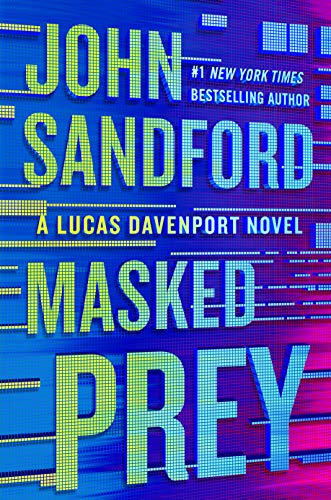
“Then I’m like that Mission: Impossible thing, where the secretary will disavow any knowledge of me?”
“So fast your head will spin off—although it’d probably be a deputy assistant undersecretary in charge of cover-ups,” Henderson said. “You’re not nearly important enough to be disavowed by an actual secretary.”
John Sandford’s Lucas Davenport “Prey” series rolls along, dispensing dependable entertainment for the thriller fan. I’m kind of sad Davenport has taken his show on the road, operating as a US Marshal now, rather than sticking to Minnesota, my stomping grounds. But the stories remain good.
In Masked Prey, the teenaged daughter of a female senator, who has made herself a minor celebrity through podcasting, discovers a site on the Dark Web. This site posts excerpts from extreme Alt-Right sites, along with candid photos of the children of a number of legislators. No explicit threat is made, but it seems to be an invitation to target the kids for political purposes. The girl – and her mother – both freak out. The FBI makes a political decision to turn it over to Marshal Lucas Davenport, who’s good with bizarre problems and lateral thinking. What’s implicit, but not stated, is that they want Davenport to hunt the (expletive deleted) down and kill him with minimum fuss.
As Davenport pokes into the world of the Alt-Right, a “lone psycho” begins his journey of what he considers self-actualization. It’s his destiny, he believes, to change history by killing a lawmaker’s kid. He has to learn how to kill – which he does, and it’s harder than he expected – but he’s determined, and intelligent enough to make it work.
This story moves further into politics than most of Sandford’s books, but I think he squares the circle pretty well, generally. He establishes early on that Davenport himself tends to the conservative side. And his right-wing activists are deeper and more faceted than you might expect.
I did find what I believe to be a factual error in this book. I have no personal experience here, but I’m given to understand that the way the villain acquires a couple firearms in this book is not correct. You can’t (or so I’m told) simply walk into a gun show and walk out with a couple of guns, without a background check. Maybe I missed a technical point.
I’ve seen John Sandford criticized for having only one character, and there’s some justice in that. At least in terms of the jokes they make, all his characters talk pretty much the same. But the jokes work, and they’re often politically incorrect, so I’m not complaining.
Recommended, with cautions for language, adult themes, and disturbing scenes.








